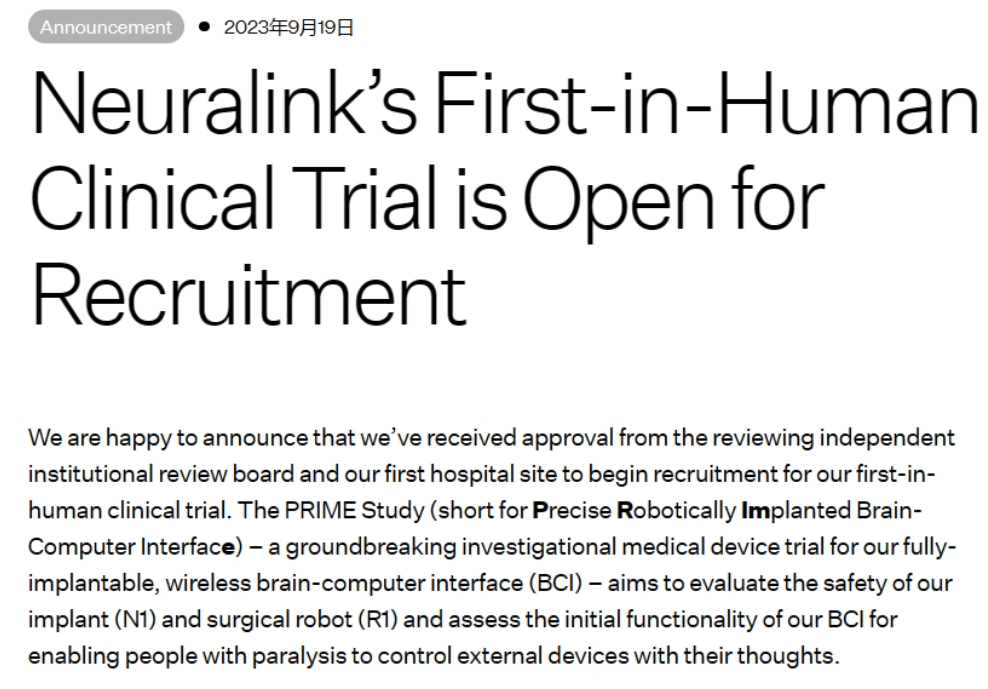 Technology peripherals
Technology peripherals
 AI
AI
 Musk's brain-computer interface company gets approval to conduct human trials! Is the need for medical treatment more urgent?
Musk's brain-computer interface company gets approval to conduct human trials! Is the need for medical treatment more urgent?
Musk's brain-computer interface company gets approval to conduct human trials! Is the need for medical treatment more urgent?
Neuralink, a brain-computer interface company owned by Tesla CEO Musk, has received approval from an independent review committee to conduct the first human trial and implant the device into the brains of paralyzed patients. This is a new development in the field of brain-computer interface
Stimulated by the news, on September 20, the human brain engineering sector was among the top gainers, and Innovative Medical (002173.SZ) was the first to close the market. As of the close of the day, Innovative Medical rose 10.01%, Guanhao Biotech (300238.SZ) rose 7.13%, and Sanbo Brain Science (301293.SZ) rose 6.06%.

Brain-computer interface technology will be tested on humans
Musk’s brain-computer interface company Neuralink recently announced that the company has received approval from an independent review committee and will conduct the first human trial. The research will test the safety and effectiveness of a wireless, fully implantable brain-computer interface that would allow paralyzed patients to control external devices with their brains.

Meanwhile, Neuralink has begun recruiting patients for its clinical trial, and those paralyzed by cervical spinal cord injury or amyotrophic lateral sclerosis may be eligible to participate in the trial
It is understood that the duration of this human trial is six years, and participants need to first participate in an 18-month study, after which they will spend at least 2 hours a week on brain-computer interface research.
According to Neuralink, the research plans to use robotic surgery to implant ultra-thin and flexible wires into the movement intention-controlling areas of the brain. These implants can record brain signals and transmit them wirelessly to decode movement intentions. Applications that enable people to control the computer's cursor or keyboard with their awareness
Domestic companies already have related products
Driven by scientific and technological progress, brain-computer interface technology is moving towards the forefront at an astonishing speed. At the same time, competition in this emerging track is becoming increasingly fierce.
As an important force in global scientific and technological innovation, China is actively promoting the development of brain-computer interface technology. Recently, the Ministry of Industry and Information Technology organized the unveiling of future industrial innovation tasks in 2023, focusing on fields such as the metaverse, humanoid robots, brain-computer interfaces, and general artificial intelligence
In the future, we will work hard to discover and cultivate a group of advantageous units that master key core technologies and have strong innovation capabilities to accelerate the application of new technologies and new products. At the same time, we will also strive to break through a number of iconic technology products to promote the process of technological development
Although the research on brain-computer interface technology in my country started late, the overall development momentum is good, the growth rate is rapid, and great progress has been made in all aspects. Some technologies have achieved large-scale applications in medical, education, national defense, transportation, entertainment and other fields
In China, most companies are focusing on the layout of non-invasive brain-computer interface products. Companies such as Huinao Intelligence and Qiannao Technology have launched mature consumer-grade products. In the field of invasive brain-computer interfaces, only a few companies such as Brain Tiger Technology and Brighton Technology are conducting relevant research
Qianzhan Industry Research Institute believes that my country’s brain-computer interface industry is still in the early stages of development, and the entire industry still has some way to go before large-scale industrialization. Driven by policies and market demand, the brain-computer interface industry has huge potential for future development.
The demand for medical applications is more urgent
CITIC Construction Investment pointed out in the research report that brain-computer interface technology is an important strategic direction for a new round of scientific and technological revolution and industrial transformation. The future industry represented by brain-computer interface has already embarked on the fast lane.
According to Mckinsey’s research report, it is expected that the market size of brain-computer interface will reach US$70 billion to US$200 billion from 2030 to 2040.
Huaxin Securities pointed out that the medical field has a very urgent demand for the application of brain-computer interfaces, and the entire market has broad development prospects. Since the research and development of brain-computer interface products is still in the early stages, and the technology iteration and technology trends are not yet clear, it is recommended to pay attention to suppliers that provide brain-computer interface surgery services
Based on existing medical service resources and brand advantages, Innovative Medical continues to increase investment in the field of medical services and expand the scale of medical services. The company and Mr. Xu Kedi jointly established Hangzhou Boling Medical Technology Co., Ltd., which is committed to promoting the research, development and application of brain-computer interface related technologies
With neurology as the core, Sanbo Brain Department adheres to the development of a strong specialty and small comprehensive model, and gradually established a medical service network covering core areas across the country, providing services to people all over the country, Europe, the United States, Southeast Asia and other countries. The company is very optimistic about the clinical application prospects of brain-computer interface technology in the fields of neuromedicine and neurological rehabilitation. The company has always paid attention to the development of this technology in the medical field, and actively participated in basic applications and explored clinical applications
The above is the detailed content of Musk's brain-computer interface company gets approval to conduct human trials! Is the need for medical treatment more urgent?. For more information, please follow other related articles on the PHP Chinese website!

Hot AI Tools

Undresser.AI Undress
AI-powered app for creating realistic nude photos

AI Clothes Remover
Online AI tool for removing clothes from photos.

Undress AI Tool
Undress images for free

Clothoff.io
AI clothes remover

Video Face Swap
Swap faces in any video effortlessly with our completely free AI face swap tool!

Hot Article

Hot Tools

Notepad++7.3.1
Easy-to-use and free code editor

SublimeText3 Chinese version
Chinese version, very easy to use

Zend Studio 13.0.1
Powerful PHP integrated development environment

Dreamweaver CS6
Visual web development tools

SublimeText3 Mac version
God-level code editing software (SublimeText3)

Hot Topics
 Best AI Art Generators (Free & Paid) for Creative Projects
Apr 02, 2025 pm 06:10 PM
Best AI Art Generators (Free & Paid) for Creative Projects
Apr 02, 2025 pm 06:10 PM
The article reviews top AI art generators, discussing their features, suitability for creative projects, and value. It highlights Midjourney as the best value for professionals and recommends DALL-E 2 for high-quality, customizable art.
 Getting Started With Meta Llama 3.2 - Analytics Vidhya
Apr 11, 2025 pm 12:04 PM
Getting Started With Meta Llama 3.2 - Analytics Vidhya
Apr 11, 2025 pm 12:04 PM
Meta's Llama 3.2: A Leap Forward in Multimodal and Mobile AI Meta recently unveiled Llama 3.2, a significant advancement in AI featuring powerful vision capabilities and lightweight text models optimized for mobile devices. Building on the success o
 Best AI Chatbots Compared (ChatGPT, Gemini, Claude & More)
Apr 02, 2025 pm 06:09 PM
Best AI Chatbots Compared (ChatGPT, Gemini, Claude & More)
Apr 02, 2025 pm 06:09 PM
The article compares top AI chatbots like ChatGPT, Gemini, and Claude, focusing on their unique features, customization options, and performance in natural language processing and reliability.
 Is ChatGPT 4 O available?
Mar 28, 2025 pm 05:29 PM
Is ChatGPT 4 O available?
Mar 28, 2025 pm 05:29 PM
ChatGPT 4 is currently available and widely used, demonstrating significant improvements in understanding context and generating coherent responses compared to its predecessors like ChatGPT 3.5. Future developments may include more personalized interactions and real-time data processing capabilities, further enhancing its potential for various applications.
 Top AI Writing Assistants to Boost Your Content Creation
Apr 02, 2025 pm 06:11 PM
Top AI Writing Assistants to Boost Your Content Creation
Apr 02, 2025 pm 06:11 PM
The article discusses top AI writing assistants like Grammarly, Jasper, Copy.ai, Writesonic, and Rytr, focusing on their unique features for content creation. It argues that Jasper excels in SEO optimization, while AI tools help maintain tone consist
 Choosing the Best AI Voice Generator: Top Options Reviewed
Apr 02, 2025 pm 06:12 PM
Choosing the Best AI Voice Generator: Top Options Reviewed
Apr 02, 2025 pm 06:12 PM
The article reviews top AI voice generators like Google Cloud, Amazon Polly, Microsoft Azure, IBM Watson, and Descript, focusing on their features, voice quality, and suitability for different needs.
 Top 7 Agentic RAG System to Build AI Agents
Mar 31, 2025 pm 04:25 PM
Top 7 Agentic RAG System to Build AI Agents
Mar 31, 2025 pm 04:25 PM
2024 witnessed a shift from simply using LLMs for content generation to understanding their inner workings. This exploration led to the discovery of AI Agents – autonomous systems handling tasks and decisions with minimal human intervention. Buildin
 AV Bytes: Meta's Llama 3.2, Google's Gemini 1.5, and More
Apr 11, 2025 pm 12:01 PM
AV Bytes: Meta's Llama 3.2, Google's Gemini 1.5, and More
Apr 11, 2025 pm 12:01 PM
This week's AI landscape: A whirlwind of advancements, ethical considerations, and regulatory debates. Major players like OpenAI, Google, Meta, and Microsoft have unleashed a torrent of updates, from groundbreaking new models to crucial shifts in le





